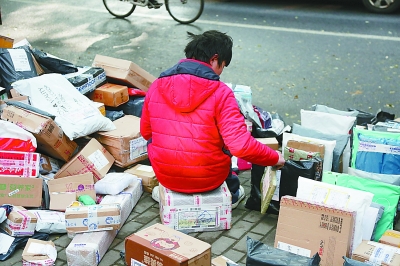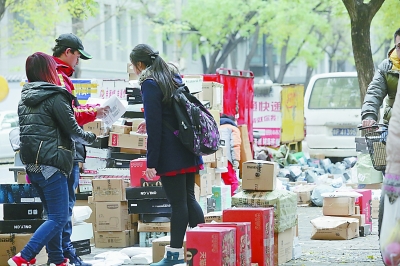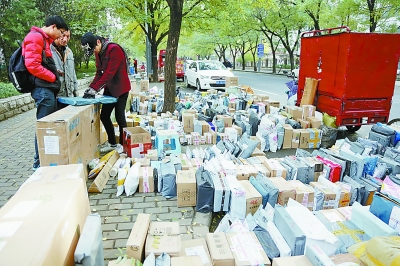Express brother "passive environmental protection" this year: 10 cartons can save 7 yuan.



A few days ago, statistics from the State Post Bureau showed that China’s express delivery business exceeded 20 billion pieces last year. According to 0.2kg per package, 20 billion packages will generate 4 million tons of packaging waste. These figures have aroused people’s concern and anxiety about express packaging waste.
In the past few days, a reporter from Beijing Evening News visited and found that behind the huge amount of garbage generated by express packaging shown by these figures, couriers spontaneously formed a chain of recycling express packaging at the end of the express delivery industry for the sake of reducing costs and maximizing profits, large and small cartons and foam fillers that have long been rejected by the waste acquisition industry are among the recycling of couriers.
It is a habit to ask for cartons while delivering express mail.
At 7 o’clock in the morning of April 11, the courier Bai Gang started the electric tricycle, ready to leave and deliver the parts.
On the way, Bai Gang met an early stall, bought himself a porridge, and quickly drank it into his stomach with a straw while driving. He had a stomachache last night, so he should pay attention to breakfast.
I have been in Beijing for more than a year, and almost every morning, Bai Gang is awakened by an alarm clock. He is 21 years old and lives in the staff dormitory provided by the courier company. In the same dormitory, the oldest colleague is five years older than him and is planning to quit his job and change his career.
For more than a year, Bai Gang felt that the best thing he encountered was that accommodation was free. "The rent is too expensive to afford." Every day, he drives a van electric tricycle to go out early and come back late. He has no chance to fall in love, and the number of times he goes online is counted. The most relaxing time is lying in bed chatting with his roommate, and he often falls asleep while chatting.
When I woke up at dawn, it was another day of driving around and making countless phone calls.
At 10 o’clock in the morning, Bai Gang passed by the back door of an office building and saw the cleaning staff in the building going out with a stack of cartons and walking to the place where garbage was piled up. Bai Gang drove to catch up and stopped the other side while calling "Big Sister". In less than a minute, smiling Bai Gang got the stack of cartons and even said "thank you" three times.
The outermost layer of the stack of cartons, nearly 50 cm long and 30 cm wide, can be put into a medium-sized microwave oven. There are four cartons in the carton according to its size, and the smallest one is about equal to the volume of a packed lunch box.
Bai Gang dug out an old rope from his carry-on bag, put the carton on the roof of the van electric tricycle, tied it with ropes on both sides and continued to drive the parts.
When asking people for cartons, Bai Gang meets two or three times a day, and almost every time he succeeds. "Because I threw it, I threw it. The other party felt that giving it to me or throwing it didn’t affect them, so they gave it to me. They also made a good person." Bai Gang told the Beijing Evening News reporter.
Save some cost by "picking up" cartons
A few days ago, Beijing Daily reported that the statistics of the State Post Bureau showed that China’s express delivery business exceeded 20 billion pieces last year. According to the calculation of 0.2 kg per package, 20 billion packages will produce 4 million tons of packaging waste. These figures have aroused people’s concern and anxiety about the garbage produced by express packaging. Soon, Bai Gang and some colleagues met many strangers’ inquiries.
A few days ago, Bai Gang sent a courier to a community. The community security guard looked at him at the door and asked him: "So many cartons, throw them away when you use them?" On another occasion, several aunts whispered beside him: "You said that all these paper boxes were used for express delivery, which was a waste."
In fact, Bai Gang has been "picking up" cartons while delivering express delivery for more than a year — — Either take the initiative to ask the customer if he can get the packed carton removed, or put in a good word with the office cleaner. Many times, as long as he is polite and "sweet-mouthed", he can always get the cartons he likes.
This is done to save costs. The same is true of other couriers in Bai Gang’s dormitory. "Every night when we go home from work, everyone can bring back some cartons, big and small. As long as they can still be used, we will collect as many as possible." Without these cartons, Bai Gang’s income will be affected. "The carton for packaging is our cost. If we buy a carton from the company, this small one," Bai Gang said, and drew a rectangle about 13 cm long and 10 cm wide for the Beijing Evening News reporter with both hands. "It costs almost 50 cents to buy a brand-new carton, and it costs one yuan to top it twice as big. I only earn a dollar by sending a courier, so I can save it, and saving a hair is a hair. " However, Bai Gang and his colleagues have not carefully calculated how much they have saved.
There is a foot bath basin waiting to be delivered in Bai Gang’s car. He pointed to the outer packaging carton of the foot bath basin and said, "This big one, if the customer says it is useless, we are also willing to take it. As long as the carton itself can still be used and has not been severely deformed, it can be continued. "
With the old paper box, Bai Gang and his colleagues will not collect money from the sender. "You can’t make much money by this, just save some costs." Because of this spontaneous "recycling" behavior, Bai Gang felt that he was also environmentally conscious. "At least I didn’t take the initiative to make garbage, and I was using it as much as possible."
There is also a courier who revealed that in order to save costs, many branches no longer buy packaging cartons with the company’s unified logo from the head office. "If the courier needs a packing box, many senders will prepare the box themselves, and in addition, we will prepare some ourselves."
Waste stations can also be used if they are not needed.
In addition to packaging cartons, some express fillers are also regarded as "treasures" by Bai Gang.
Foam block, shockproof bubble film, bubble bag, air column bag, cushioning shockproof airbag and foam film, as long as they encounter these reusable fillers, Bai Gang will have the cheek to ask if they can be taken away. "I couldn’t pull my face down when I asked for these things a few times ago. I felt like a rag picker. I got used to it after a few more times."
In the express delivery company where Bai Gang works, the filling foam and shockproof bubble film should be purchased by the weight and the meter respectively. "I’m not sure how much the bubble film is converted. If it is one meter, it may be one or two dollars."
Sometimes, if the customer wants to use too much filler, Bai Gang will also feel "distressed". So many foam blocks that have been collected hard may be in a big box and used up in a few times.
In order to ensure that the goods are intact during long-distance transportation, the sender and courier will pay special attention to the packaging. According to work habits, if the items to be sent are clothes and textiles, Bai Gang usually puts two layers of plastic packaging bags on the items, and then crosses them with adhesive tape. If it is fragile things such as cosmetics, he told the Beijing Evening News reporter that the usual operation process is "first wrap it tightly with foam film or bubble film and put it in the box. Take newspapers and foam blocks where there is a gap, so as not to sway things back and forth in the box. Finally, seal the box with tape. If the box is small, sometimes put a plastic packaging bag, and finally stick a courier."
Bai Gang is very willing to pack his own materials. "Be sure to wrap it up, pack more newspapers, or wrap several layers of bubble film or foam blocks. You can’t take risks just because you save something. It’s even more troublesome for you to save that money and lose it to others. "
Bai Gang will spend money on packaging supplies, mainly adhesive tapes. "7 yuan a roll, small pieces can be used for a long time. If it is big, maybe, sometimes a big shipment is bundled into a roll." In his electric tricycle, there are three rolls of scotch tape, sometimes more, "to be reserved".
Ten cartons can save 7 yuan.
For Bai Gang and some colleagues who "pick up" boxes and fillers like him, the most used and discarded ones are plastic packaging bags and adhesive tapes, "followed by paper file bags, so there is no way. These are obviously disposable packaging supplies, and it is really impossible to recycle them."
A few days ago, the Beijing Evening News reporter visited a number of waste collection stations and learned that they all said that they would not recycle plastic packaging bags. A waste buyer said that there is no market for plastic packaging bags after recycling. "It is also collected for nothing, without that effort." In the process of waste recycling, some plastic packaging bags and tapes will be received and thrown away. Another waste buyer said, "It is generally burned, can’t be sold, and it is useless to keep it."
There are also some foam products that can’t enter the recycling process. "I didn’t accept these a few years ago, let alone waste tape." The waste purchaser said.
Earlier media reports said that according to incomplete statistics, China produces about 16 million tons of packaging waste every year, and the proportion of packaging materials in urban solid waste exceeds 30%. The tape used for express packaging for one year can circle the earth more than 200 times.
Among the many courier companies visited by the Beijing Evening News reporter recently, only one company asked its couriers to ask customers if they could recycle the company’s boxes and fillers for reuse. A courier of the courier company said that at present, the company’s packaging materials have not been charged, "I heard that it will start to collect money for a while." Many other courier companies have not made such requirements, and couriers spontaneously seek the recycling of packaging materials.
For Bai Gang, as a practitioner, he became a passive environmentalist in order to save costs and improve profits to the maximum extent. At the end of the day, the number of large and small cartons he can get is "as few as a dozen". "Sometimes he can ask for more when he catches up with the office cleaning aunt, and all of them are calculated according to the medium size. It is equivalent to saving seven or eight dollars to get 10 cartons."
Of course, Bai Gang and his colleagues also have standards for material recovery — — No matter the carton or the filler, it must be clean and free of stains, and it must be reused. "Now that e-commerce is so developed, it depends entirely on express delivery. Express delivery can’t be poorly packaged. If there is garbage, I think it’s not just our express delivery industry," Bai Gang said. "What we can do in this business is to reuse these things as much as possible." (At the request of the interviewee, the characters in the text are pseudonyms) Our reporter Xi Nan Photography Ji Chen